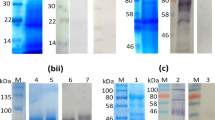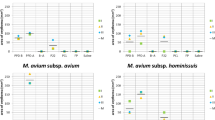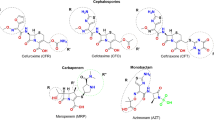Abstract
THE demonstration in human sera of precipitating antibodies against common pathogenic and non-pathogenic fungi is of interest for the study of fungal antigens and for the study in man of reactions of the Arthus type which are dependent upon the presence of precipitins. Reactions of this type have been reported1 in patients with precipitins against members of the Aspergillus genus. Certain of these sera also contained precipitins against Cladosporium herbarum and Penicillium notatum, and common antigens were demonstrated in them and in the Aspergillus genus.
This is a preview of subscription content, access via your institution
Access options
Subscribe to this journal
Receive 51 print issues and online access
$199.00 per year
only $3.90 per issue
Buy this article
- Purchase on Springer Link
- Instant access to full article PDF
Prices may be subject to local taxes which are calculated during checkout
Similar content being viewed by others
References
Pepys, J., Riddell, R. W., Citron, K. M., Short, E. I., and Clayton, Y. M., Nature, 183, 296 (1959); Amer. Rev. Respir. Dis., 80, 167 (1959).
Author information
Authors and Affiliations
Rights and permissions
About this article
Cite this article
PEPYS, J., RIDDELL, R. & CLAYTON, Y. Human Precipitins against Common Pathogenic and Non-Pathogenic Fungi. Nature 184, 1328–1329 (1959). https://doi.org/10.1038/1841328a0
Issue Date:
DOI: https://doi.org/10.1038/1841328a0
This article is cited by
-
SDS-PAGE separation of dermatophyte antigens, and western immunoblotting in feline dermatophytosis
Mycopathologia (1994)
-
The Permeability of Skin to Albumin, Dextrans and Polyvinyl Pyrrolidone**From the Chemical Defence Experimental Experimental Establishment, Porton Down, Wilts., England.
Journal of Investigative Dermatology (1966)
-
Concerning the Specificity of Dermatophyte-Reacting Antibody in Human and Experimental Animal Sera**From the Department of Microbiology, School of Medicine, Tulane University, New Orleans, Louisiana.
Journal of Investigative Dermatology (1966)
-
Fluorescence Microscopy in Dermatology
Journal of Investigative Dermatology (1963)
-
Aspergillosis report of two instances in children associated with acute leukemia and review of the pertinent literature
Mycopathologia et Mycologia Applicata (1963)
Comments
By submitting a comment you agree to abide by our Terms and Community Guidelines. If you find something abusive or that does not comply with our terms or guidelines please flag it as inappropriate.



